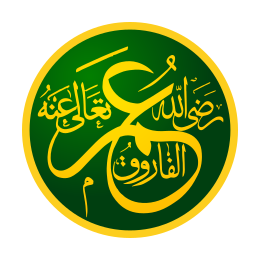Umar ibn al-Khattab (Arabic: عُمَر بْن ٱلْخَطَّاب, romanized: ʿUmar ibn al-Khaṭṭāb; c. 582/583 – 644), also spelled Omar, was the second Rashidun caliph, ruling from August 634, when he succeeded Abu Bakr (r. 632–634) as the second caliph, until his assassination in 644. Umar was a senior companion and father-in-law of the Islamic prophet Muhammad.
Quick Facts Umar عمر, 2nd Caliph of the Rashidun Caliphate ...
Umar
عمر |
|---|
|
 |
|
| Reign | 23 August 634 – 3 November 644 |
|---|
| Predecessor | Abu Bakr |
|---|
| Successor | Uthman ibn Affan |
|---|
|
| Born | c. 586 or 589 CE
Mecca, Hejaz, Arabia |
|---|
| Died | November 644 CE
(Muharram 01 AH) (aged 60–61)
Medina, Hejaz, Rashidun Caliphate |
|---|
| Burial | |
|---|
| Spouse | - Zaynab bint Madhun
- Umm Kulthum bint Jarwal
- Qurayba bint Abi Umayya
- Jamila bint Thabit
- Atiqa bint Zayd
- Umm Hakim bint al-Harith ibn Hisham[1][2]
|
|---|
Issue
(among others) |
- Hafsa
- Abd Allah
- Ubayd Allah
- Asim
- Zayd
|
|---|
| Tribe | Quraysh (Banu Adi) |
|---|
| Father | Khattab ibn Nufayl |
|---|
| Mother | Hantamah bint Hisham |
|---|
| Religion | Islam |
|---|
| Signature |  |
|---|
Close
At first, Umar opposed Muhammad and was enemy of Islam. After his conversion to Islam in 616, Umar became the first Muslim to openly pray at the Kaaba.[3] Umar was assassinated by the Persian slave Abu Lu'lu'a Firuz in November 644.[lower-alpha 1]
Umar is said to be one of the most powerful Muslim caliphs.[5] He is revered in the Sunni Islamic tradition.[6] More than 50 hadiths speak of how he was the second greatest Sahabah after Abu Bakr.[7][8] He is viewed negatively in the Twelver Shia tradition, although Shi'ite figures often married into his family and named their children after him. They view his killer as a martyr although he was not a Muslim. [9]
The date of Umar's death in the Islamic calendar is disputed. Although the sources are unanimous that Umar was stabbed in the last week of Dhu al-Hijjah, he reportedly died a few days later. According to an account of the 8th-century Medinian historian Ibn Ishaq (d. 767), Umar was stabbed on the 27th of Dhu al-Hijjah and died on the 1st of Muharram. In the work of al-Tabari (d. 923), Umar is variously reported to have died on 26th of Dhu al-Hijjah, 27th of Dhu al-Hijjah or the 1st of Muharram.
Majlisi, Muhammad Baqir. Mir'at ul-Oqool. Vol. 21. p. 199.
Al-Tusi, Nasir Al-Din. Al-Mabsoot. Vol. 4. p. 272.
Ahmed, Nazeer (2000). Islam in global history : from the death of prophet Muhammed to the first World War. Concord, CA: American Institute of Islamic History and Culture. ISBN 0-7388-5963-X. Bonner, M.; Levi Della Vida, G. "Umar (I) b. al-K̲h̲aṭṭāb". In P. Bearman; Th. Bianquis; C.E. Bosworth; E. van Donzel; W.P. Heinrichs (eds.). Encyclopaedia of Islam. Vol. 10 (Second ed.). Brill. p. 820.
Bonner, M.; Levi Della Vida, G. "Umar (I) b. al-K̲h̲aṭṭāb". In P. Bearman; Th. Bianquis; C.E. Bosworth; E. van Donzel; W.P. Heinrichs (eds.). Encyclopaedia of Islam. Vol. 10 (Second ed.). Brill. p. 820. Shi'i tradition has never concealed its antipathy to Umar for having thwarted the claims of Ali and the House of the Prophet.
- Ibn Sa'ad. The Book of the Major Classes (Tabaqat al-Kubra).
- Guillaume, A., The Life of Muhammad, Oxford University Press, 1955.
- Previte-Orton, C. W. (1971). The Shorter Cambridge Medieval History. Cambridge: Cambridge University Press.
- Donner, Fred, The Early Islamic Conquests, Princeton University Press, 1981.
- Hourani, Albert (1991). A History of the Arab Peoples. Faber and Faber.
- Madelung, Wilferd (1997). The Succession to Muhammad. Cambridge University Press.
- Madelung, Wilferd (15 October 1998). The Succession to Muhammad: A Study of the Early Caliphate. Cambridge University Press. ISBN 978-0-52-164696-3.
- Levi Dela Vida, G. & Bonner, M. (2000). "ʿUmar (I) b. al-Khaṭṭāb". In Bearman, P. J.; Bianquis, Th.; Bosworth, C. E.; van Donzel, E. & Heinrichs, W. P. (eds.). The Encyclopaedia of Islam, New Edition, Volume X: T–U. Leiden: E. J. Brill. pp. 818−821. ISBN 978-90-04-11211-7.
- Allenby, Viscount (2003), Conquerors of Palestine Through Forty Centuries, Kessinger Publishing, ISBN 0-7661-3984-0
- Hart, Michael H. (1978). The 100: A Ranking of the Most Influential Persons in History. Carol Publishing Group. ISBN 9780806513508.
- Fayda, Mustafa; Koçak, Muhşin (2007). ÖMER b. el-Hattâb - An article published in 34th volume of Turkish Encyclopedia of Islam (in Turkish). Vol. 34. Istanbul: TDV İslâm Ansiklopedisi. pp. 44–53. ISBN 978-97-53-89456-2.
- Barnaby Rogerson (2008), The Heirs of Muhammad: Islam's First Century and the Origins of the Sunni-Shia Split, Overlook, ISBN 978-1-59-020022-3
- Barnaby Rogerson (4 November 2010), The Heirs Of The Prophet Muhammad: And the Roots of the Sunni-Shia Schism, Little, Brown Book Group, ISBN 978-0-74-812470-1
- Pellat, Charles (2011). "Abū Loʾloʾa". In Yarshater, Ehsan (ed.). Encyclopaedia Iranica.
Wikiquote has a collection of quotations related to:
Umar
Wikimedia Commons has media related to
Umar.
More information Sunni Islam titles ...
Close
